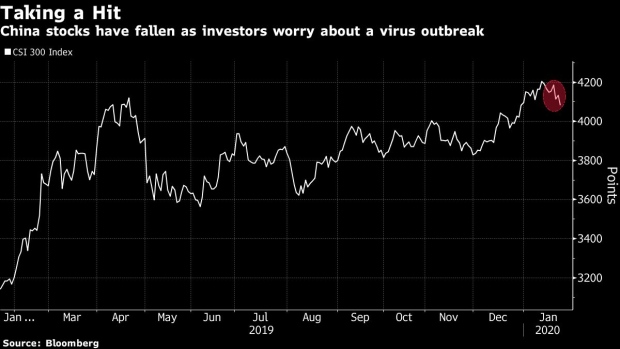Jan 22, 2020
China Stocks Drop Most Since July on Concern Virus Will Spread
, Bloomberg News

(Bloomberg) -- Sign up for Next China, a weekly email on where the nation stands now and where it's going next.
China’s financial markets are under renewed pressure after officials halted travel from a city of 11 million in an attempt to stop a new SARS-like virus from spreading.
Around 80% of stocks in Shanghai and Shenzhen fell Thursday, taking the CSI 300 Index down as much as 2%, poised for the worst decline since July. A gauge of Chinese shares in Hong Kong lost as much as 1.8%, with all but one of its 50 stocks in the red. The coronavirus, which first appeared last month in the city of Wuhan in central China, has killed at least 17 people and infected hundreds. The yuan weakened as much as 0.25% to 6.9260 per dollar.
Investors are pulling out of the world’s second largest stock market on the risk the outbreak will worsen during China’s week-long break. Stocks had rallied Wednesday after officials in Beijing detailed their response to the outbreak, helping stem the morning’s panic selling. Chinese financial markets will close from Friday for the Lunar New Year holiday, as well as stock links with Hong Kong.
“A key indicator for me will be the number of the new cases,” said Li Shiyu, managing director at Guangdong Xiaoyu Investment Management Co. “The epidemic may reach a peak in two weeks and hopefully start to slow. I may cut my positions given the market will be under pressure. If there is a trend for new cases to decline, I would consider buying shares again.”
Wuhan Department Store Group Co., which owns department stores in the city, fell 3.2%, extending its slide this week to 16%. Mask makers led gains, with Zhende Medical Co., Jiangsu Nanfang Medical Co. and Tianjin Teda Co. all jumping by the 10% daily limit. Jiangsu Yuyue Medical Equipment & Supply Co. climbed as much as 6.3%.
A gauge of consumer-staples stocks -- some of last year’s top performers -- fell for a sixth day. The Lunar New Year is a typically strong season for traveling and spending as families gather for the celebrations.
Macau casino stocks also tumbled as it reported its second case of the novel coronavirus. It also announced that it would cancel all Lunar New Year festivities. A Bloomberg gauge of Macau gaming stocks dropped as much as 2.7%, with MGM China Holdings Ltd. down 4.6% and Sands China Ltd falling 3.5%.
“Wuhan’s closure has heightened concern around the virus,” said Wu Xianfeng, an analyst at Lonteng Asset Management Ltd., adding that it should be positive in the long run if helps control the virus. “The rising number of cases is affecting investors’ risk appetite in the short term, and may delay the stock-market inflows originally expected after the Lunar New Year.”
China’s Lunar New Year Nightmare: 3 Billion Trips and a Virus
The virus has dented what had been growing enthusiasm toward equities. Confidence was riding high as Beijing signed a phase one trade deal with the U.S. and data signaled China’s economy was stabilizing. Margin debt had topped 1 trillion yuan as investors took on leverage to chase the rally, while privately-offered funds boosted their stock positions to the highest since early 2015.
“Markets were too heated up and there is room for profit taking,” said Nader Naeimi, head of dynamic markets at AMP Capital Investors Ltd. “We have sold Hong Kong shares, China A futures against the long broad EM basket this week. We’re just waiting for some heat and froth to come out before closing the shorts.”
--With assistance from Livia Yap.
To contact Bloomberg News staff for this story: Ken Wang in Beijing at ywang1690@bloomberg.net
To contact the editors responsible for this story: Richard Frost at rfrost4@bloomberg.net, Sofia Horta e Costa, David Watkins
©2020 Bloomberg L.P.